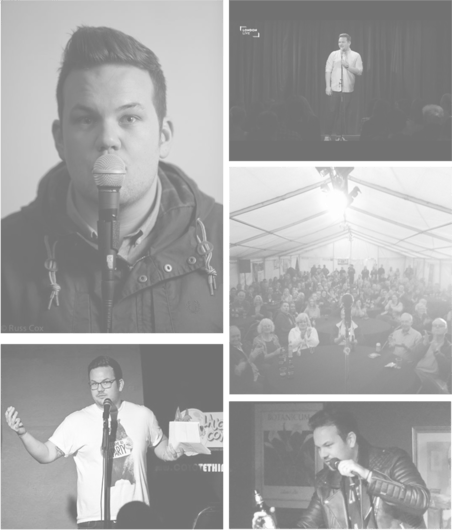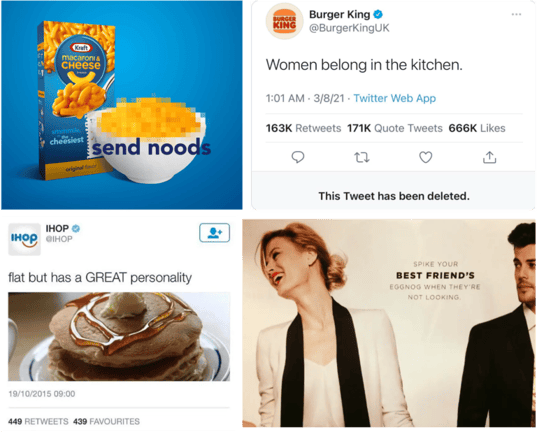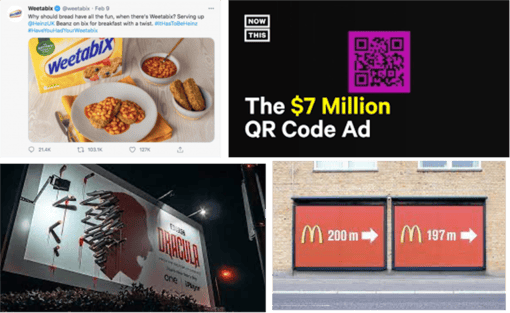September 2022
Marketing Lessons From a Stand-Up Comedian
- Strategy,
- Marketing Efficiency,
- Business,
- Lead Scoring,
- Marketing,
- Marketing Strategy,
- Brand,
- Lead Gen
AUTHOR

Russ Powell
Founder / MD
You may or may not know that our Founder/MD Russ is a bit funny. Both looking and smelling, yes.
But he also knows his way around a joke and how to make people laugh, which all stems from his time as a stand-up comic.
He makes no secret of this and was actually invited by one of our clients to present at one of their Marketing Academy sessions and delve into what marketers can learn from a stand up comedian.
Now that’s got “blog post” written all over it, hasn’t it?
So, what comedy-infused hints, tips, and insights did Russ share (that you can also use to build and deliver more creative and higher-performing marketing)?
Strap in and you’ll find out…
First thing's first
Now, to understand why Russ is qualified to talk about this kind of stuff we need to get a bit of background info on his stand-up career. This won’t last long though (we promise) and then we’ll get into the meaty bits.
Here it is from the horse’s mouth:
Hi, I’m Russ Powell and I am a former (or recovering might be a better term) stand-up comic.
I did my first gig on 13th December 2009 (actually as a dare), got the bug, and then the next decade was more or less a blur of writing, gigs, festivals, and fun.

I performed all across the UK, doing gigs that were anywhere from 2 people in the back room of a pub to 1500+ people in big theatres. I did tour support for some well-known names, I performed at festivals abroad, I wrote material for some other much more famous comedians, and I even did some TV work myself.
It was an amazing way to spend my 20’s and early 30’s. Basically travelling around, making people laugh, making friends, and getting paid for it.
But I was living a double life.
Because at the same time I was also climbing the marketing ladder, working my way up for some big tech brands you will have definitely heard of (and a few others you probably won’t have heard of).
I gained a really broad experience across the whole of the marketing mix working across comms, data & insights, events, campaign support, branding, content, bid support and pretty much everything else in between.
Eventually the comedy gave way to the marketing (when you’re looking at buying a house, getting married, and having kids the precarious nature of a career in comedy really starts to reveal itself) but my double life and dual career has all been formative in the launch, growth and success of Sharper B2B Marketing.
So, what I’m going to be sharing is how you can use what I learned during my stand-up comedy career, how that’s influenced the approach we take to B2B marketing at Sharper, and how you can build more creative and better-performing campaigns as a result.
B2B Marketing & Comedy
Now, on the surface of it marketing and comedy may not seem to have much alike but there are some definite commonalities they share:
The first and the biggest is that both are all about people.
Without a focus on people comedy is just someone talking to themselves in the corner of a room. Without a focus on people marketing is just a company shouting as loud as they can and “doing some stuff” in the hope that someone might possibly listen.
Neither is a good way to spend any amount of time, effort, or money.
With marketing as with comedy, you are always trying to capture people’s attention, and then sustain that attention with a view to either a) eliciting an emotional response b) making them take action, or c) a & b
And this is often something that gets forgotten, especially in B2B. You are marketing to people who have emotions.
There is an odd assumption in B2B that because we’re talking to people about tech or surface-level “boring” stuff everything needs to be on a rational, logical, and emotionless level. But nobody turns off their emotions and becomes a “Business Bot 4000” when they turn their laptop on.
Sure, people might be a slightly different versions of themselves when they’re at work, but they will still want and will enjoy being entertained, intrigued, caught-of-guard and/or challenged.
People don’t turn their emotions off. Marketers (like comedians) should always be looking to tap into those emotions.
The second commonality is that everyone thinks they can do it.
I’m sure many of us have had a non-marketer (I’m looking at you, sales peeps) tell us how easy our jobs are to do and how simple it would be to “just do this…”
We’ve probably all been asked to “sprinkle some marketing magic” on something, or to “jazz up” a deck, or had a “oh, could you just…” request. These all belie all of the hard work and graft that us marketers have to put in to actually make stuff happen.
And it’s the same with comedy. What you see up on stage is – generally – made to look easy because people don’t see the hard work that goes into getting to that point.
Everyone thinks they can do it – marketing or comedy – because they don’t see what goes on behind the scenes. If they did, they definitely wouldn’t think they could just do it.
The third is that both are wonderfully unpredictable.
With comedy you can have material that’s worked 100 times before totally flop in front of a new audience. Or you can have a throw away comment leave people crying with laughter.
It definitely isn’t an exact science, and marketing is pretty much the same.
You can craft the most beautiful campaign you’ve ever seen in your life, launch it to market, and it absolutely dies and delivers nothing.
Equally, you can have some super-basic “quickly bash it out” activity rapidly take off and deliver results you’ve never expected or seen before.
This is because – and circling back to the first point of these three – it’s all about engaging people. Those predictable, irrational, illogical people. If you can’t appeal to them and make them think, feel, or do something it’s all for nothing.
There are obviously things you can do to increase the possibility of things being a hit. You can rely on experience, best practice, and expert knowledge to give you the best chances possible, but nothing is ever guaranteed. (Which is part of the reason I love both marketing and comedy).
The Science of Humour
Now, because we’re talking about how we can better engage people it’s worthwhile having a quick look at what’s going on inside people’s heads and why comedy, humour, and things that are fun work so well to grab people’s attention.

The first is that we all suffer from cognitive overload.
All of our brains are constantly full and we’re continually bombarded with external and internal stimuli battling for our attention and brain power.
So, in this world of constant bombardment only the things that are worthy of attention – that is those things that are different or important enough to be recognised as and processed as worthy of attention – will make the cut and be given some of that limited brain power by people.
Is a typical, dull, and dry B2B marketing approach of another whitepaper, another webinar, or a standard one-pager going to make it through this cognitive fog?
Probably not.
But humour does. You can still use all the content and topics you would have for your whitepapers, webinars, and one-pagers but if you can layer this with a different, inventive, or creative message or experience it demands a reaction, cuts through, and makes people take notice.
Humour is also valuable as it’s an incredibly strong way of bringing people together, through shared experience.
It’s been shown that babies develop a sense of humour from as young as 6 weeks old, where they smile or laugh at our stupid faces, but this is also an evolutionary mechanism used to better connect babies to the group (and ensure they’re looked after and cared for as they need to be).
And that shared experience with humour continues into later life.
We’re 30x more likely to laugh at something when we’re with other people and I’m sure some of the fondest memories or shared experiences you have with your friends and family are those that are injected with humour and fun.
Those positive emotive states and the release of chemicals in our brains that go along with it build strong, near-permanent memories. And with marketing, you absolutely want to be remembered.
Also, if you can make people laugh (or at least cause them to do a puff of air out of their nostrils) you are essentially demonstrating that you either understand or think the same way as them about a certain topic.
And if you can do that you endear yourself to others, show them you’re like them, and therefore demonstrate you’re part of their “in group” and lower-risk to engage with (all of which are incredibly useful for marketing).
And as Plato said “the highest form of intelligence is empathy”.
But a word of caution…
“Funny” vs Fun
The main objective with comedy is clearly to be funny. To entertain people and leave them feeling good, happy, and like they’re had a great time.
But what is “funny” is very subjective.
What one person finds hilarious another may find incredibly offensive. What leaves one person rolling on the floor with laughter may leave another trying to get you “cancelled”.
And it’s this subjectivity that means with marketing you need to be incredibly careful if you’re trying to be funny.
I’ve got a few examples here of where brands have tried too hard to be “funny”, make jokes, and have missed the mark and caused a lot of offense in the process. (Unless you think that sending naked pictures, misogyny, objectifying women, and spiking peoples drinks are suitable devices for getting a brands message across).

Instead, if we want to engage and entertain people, we need to lean more towards things that are fun rather than “funny”.
Like these examples here. There aren’t any “jokes” in these campaigns, instead they’re focused on engaging, intriguing, and entertaining their target audiences in a light-hearted way.

Each of these taps into either great idea or some universal commonality (or both) that grabs people’s attention and then helps promote the brand or offering in the process.
Making things more sticky
So, taking onboard what we’ve just covered off there are 4 keys things you need nail if you want your marketing (or your comedy) to be more sticky, memorable, and do what you need it to do.
Make it relevant (to people and their world)
The more relevant to your target audience you can make things the better.
With comedy you wouldn’t use exactly the same material for every single audience. You’d cherry pick from a range of different jokes and routines, tweaking each as you go to ensure maximum impact with the audience in front of you at that time.
The same logic applies to marketing.
One-size-fits-all generally fits no body. If you target “everyone”, you really target no one. You need to tailor, tweak, and reformat what you’re doing based on a clear understanding of your target audience and their world.
When you do, you show that you “get them”, understand what’s going on in their world, and are therefore more likely to be able to help them with their own challenges.
Make it timely (and in context)
There’s an old saying that “comedy is tragedy, plus time”. And whilst that may be true for telling jokes you don’t really want to be using tragedies as a means of engaging an audience, but you do still need to be aware of time and timings when it comes to your marketing.

Be aware of what’s going on in a general sense and look to tie marketing to that. “Time of year” campaigns – Christmas, Easter, Halloween – that are given the necessary amount of creative thought can work wonders for cutting through and engaging people.
Be aware of time relative to events. If you’re trying to position yourself as being on the cutting edge and down with all the latest trends you need to react accordingly. Commenting on or creating content about something that’s trends-based after the fact will only make you look slow.
And be aware of time relative to your audience. If you’re targeting very senior decision makers don’t try and take up lots of their time with your marketing. Focus instead on making instant impact and grabbing attention quickly with these very cognitively overloaded individuals.
Make it consistent (and consistently unpredictable)
This is all about developing a tone of voice and style of communicating with your audience that is your own and then sticking to it (within reason).
In B2B there is often a default way of talking that many brands get sucked into. Long words, overly technical language, safe and uninspiring messages. It’s essentially the bland leading the bland. And marketers think you have to do it because that’s what everyone else does.
But taking that approach won’t help you stand out and it won’t help you engage people as people. Thin about your favourite comic. They WILL have a unique way of communicating that is all their own.
So, you should look to strip out all of the platitudes, cliches, and “bullsh!t bingo” words from your marketing and instead focus on talking to people like people. But ensure you give yourself breathing room to grow and develop things too.
Teenagers and their grandparents may speak the same language but they don’t talk the same. Communication styles grow, change, and develop as people do. Brands are just the same.
Be persistent (think in years, not quarters)
Most B2B brands think about their marketing quarter by quarter, regurgitating the same content and campaigns under a new title every 3 months.
They get trapped on the hamster wheel of short-term sales activation (because if you’re doing things quarter by quarter that’s what you’re aiming at, not actual marketing) because they’ve got to generate leads RIGHT NOW!!
But – to quote a well-worn stat – only 5% of the market are buying right now. So, what of the other 95% of potential future buyers? You’ll just have to hope they drop in at the right time in one of those 3 month cycles.
Unless you shift thinking and start playing the long game.
With comedy you don’t write a brand new set for every gig you do. You don’t write specifically for a single moment in time. You write jokes, weave them together, find the gaps in old material, build themes, and create stories until you’ve built a massive body of material you can use at will wherever you may go.
You not going on “Live at the Apollo” with your first every gig. So, you shouldn’t expect to land a massive deal with your first marketing campaign. You need to iterate, grow and develop things over time (not every 3 monhs).


